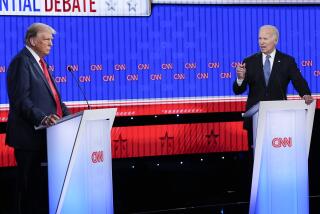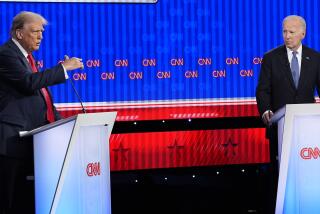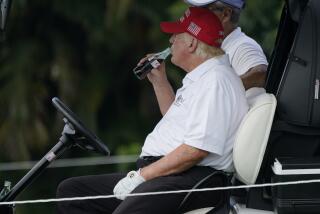Gov. Bush Denies Illegal Drug Use in Last 25 Years
- Share via
Texas Gov. George W. Bush, answering questions he assiduously--and angrily--avoided for years, Thursday proclaimed himself drug-free for more than two decades.
But rather than resolve rumors about his admittedly hard-partying past, Bush’s circumscribed statements renewed speculation about his personal conduct--and a debate over the bounds of legitimate press inquiry. Bush’s qualified comments--the first significant controversy of his campaign--also drew comparisons to President Clinton and his habit of dribbling out denials.
Speaking to reporters in Roanoke, Va., during a stop at a youth center, Bush said Thursday he could clear a background check going back 15 years from his father’s years in the White House, including questions about past illegal drug use. The period would extend to 1974, when Bush was in his late 20s.
“Not only could I pass the background check and the standards applied to today’s White House,” Bush told reporters, “but I could have passed the background check and the standards applied on the most stringent conditions when my dad was president of the United States.”
The senior Bush served as president from 1989 to 1993.
Just a day earlier, in an interview with the Dallas Morning News, Bush had declared himself drug-free for at least the last seven years.
His explicit, if calibrated, denial of drug use over a specific period of time marked a turnabout for the GOP presidential front-runner, who as recently as last weekend insisted he would not “play the Washington, D.C., game of gossip” by answering such inquiries.
The 53-year-old Bush has often admitted to a venturesome past, including heavy drinking until he swore off alcohol on his 40th birthday. He has also declared himself faithful to his wife, Laura, throughout their 21 years of marriage. But up until this week, Bush had repeatedly and sometimes heatedly refused to answer specific questions regarding rumors of cocaine use.
That changed when the Morning News asked whether, as president, Bush would insist that his appointees answer drug-use questions contained in the FBI’s standard background check.
“As I understand it, the current [FBI] form asks the question, did somebody use drugs within the last seven years, and I will be glad to answer that question, and the answer is no,” Bush said.
On Thursday, Bush went further, essentially denying any drug use over the last 25 years. Beyond that, however, he refused to say.
“I believe it is important to put a stake in the ground and say enough is enough when it comes to trying to dig up people’s backgrounds in politics,” the candidate told reporters at a follow-up news conference in Columbus, Ohio.
“I’m going to tell people I made mistakes and that I have learned from my mistakes,” Bush said. “And if they like it, I hope they give me a chance. And if they don’t like it, they can go find somebody else to vote for.”
Instead of quashing widely whispered rumors about his past, however, Bush’s statements drew intense new focus to the unsubstantiated allegations of drug use--and criticism from supporters and opponents alike, who compared his carefully crafted responses to Clinton’s famous evasions.
For years, Clinton ducked questions about drug use by saying he had “never violated the laws of my country.” Only when an interviewer asked during the 1992 presidential primaries about international laws did Clinton admit to trying marijuana while studying abroad.
“It’s Clintonesque,” one frustrated Bush supporter said of the governor’s evolving approach to discussing his past indiscretions. “He wants to be the anti-Clinton, but he’s looking more like Clinton.”
A Bush spokesman dismissed the comparison. “Far from it,” said Scott McClellan. “Gov. Bush has said he has learned from his mistakes and he’s honest about it.”
As Texas governor, Bush endorsed several anti-drug measures, including laws that toughened penalties for people convicted of possessing or selling less than a gram of cocaine.
Publicly, the governor’s opponents sought to distance themselves from the budding controversy. “I’m not going to comment on George Bush’s life,” Elizabeth Hanford Dole said after being peppered with questions as she left a fund-raising lunch in Irvine, Calif. “That’s his personal life.”
Sen. John McCain of Arizona was a bit more equivocal. “If it was my preference, I would allow the governor privacy on this issue,” McCain told reporters after delivering a speech on technology issues in San Francisco. “But I also understand that the media and the American people are the ones that make that decision.”
Privately, however, rival camps took no small delight in watching Bush encounter the first rough patch of a seemingly effortless campaign. “Seven years. Fifteen years. Twenty-five years,” one opposition strategist scoffed in reference to Bush’s shifting statements.
“Republicans are sick of Clinton,” said another rival strategist. “The more they see of Bush, the more they’re going to see Clinton.”
A survey released Thursday showed support for Bush slipping somewhat in New Hampshire, the first primary state. The poll by the American Research Group, an independent firm, suggested that Bush received little benefit from his victory in last weekend’s Iowa straw poll: Bush had 40% support in New Hampshire, down 7% from last month, compared with 16% for McCain. The rest of the nine-candidate field registered only in single digits.
“In Iowa he went from phenom to front-runner,” said one GOP strategist, unimpressed with Bush’s 31% showing in the mock election. “Now this controversy takes him down another notch because he looks inconsistent and different from how he wants to portray himself.”
At the same time, the contretemps renewed the quadrennial debate over the boundaries the media should observe in exploring the private lives of presidential candidates.
Edwin Guthman, a professor of journalism at USC and former Los Angeles Times national editor, suggested Bush helped create the controversy by the way “he waltzed around the question” of drug use.
“The best thing in politics is to tell the truth and get on with it,” Guthman said. Even so, he suggested the cocaine controversy “doesn’t need the kind of attention it’s getting beyond that. Unless it relates to [the candidate’s] performance in office, it seems irrelevant.”
Inside the Bush campaign, the attitude was much the same. “You can put in a not-very-large phone booth the people who are going to be concerned about this,” said one senior advisor. “. . . There is a sense of ‘enough of this’ that resonates with people, and that’s what [Bush] is reflecting.”
Recent polls have suggested some ambivalence on the part of the public. A survey by Fox News/Opinion Dynamics found that 69% said they would want to know whether a presidential candidate had used cocaine in the past. But only 17% said cocaine usage should disqualify a candidate; 72% said a candidate should be forgiven.
Times political writers Cathleen Decker and Ronald Brownstein and staff writer Maria L. La Ganga also contributed to this report.
Hear political writer Mark Z. Barabak discuss the effect of questions relating to Bush’s past personal conduct on The Times’ Web site:
http://161.35.110.226/bush
(BEGIN TEXT OF INFOBOX / INFOGRAPHIC)
What He Says
Quotes from Texas Gov. George W. Bush in response to questions Wednesday and Thursday about illegal drug use:
“Somebody floats a rumor and it causes you to ask a question, and that’s the game in American politics, and I refuse to play it. That is a game. You just fell for the trap. I refuse to play. They’re ridiculous and they’re absurd, and the people of America are sick and tired of this kind of politics. And I’m not participating.”--At a news conference Wednesday in Austin, Texas.
“As I understand it,the current (FB) form asks the question, did somebody use drugs within the last seven years, and I will be glad to answer that question, and the answer is no.”--As quoted Thursday by Dallas Morning News.
“I don’t want to send a signal to children that whatever I may have done is OK.”--At Columbus, Ohio, news conference Thursday.
The Other Candidates’ Answer on Drug Use
Gary Bauer (R): No.
Bill Bradley (D): Yes
Patrick J. Buchanan (R): No
Elizabeth Hanford Dole (R): No.
Steve Forbes (R): No
Al Gore (D): Yes
Orrin G. Hatch (R): No
Alan Keyes (R): No.
John McCain (R): No.
Dan Quayle (R): No
Note: Bradley says he tried marijuana several times in the early 1970s; Gore says he used marijuana a few times in college, Army and graduate school.
Source: Times; staff and wire reports; compiled by MASSIE RITSCH / Los Angeles Times
More to Read
Get the L.A. Times Politics newsletter
Deeply reported insights into legislation, politics and policy from Sacramento, Washington and beyond. In your inbox twice per week.
You may occasionally receive promotional content from the Los Angeles Times.











